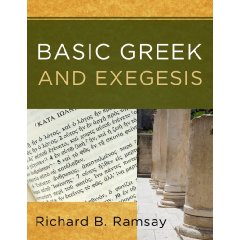 I just finished Dr. Richard B. Ramsay’s recent book Basic Greek and Exegesis. Having taught introductory NT Greek and having studied exegesis on the seminary level, I was glad for the opportunity to read this book. This book is the text that Ramsay uses to teach the class (with the same name) at Miami International Seminary, his online school. In this book, Ramsay sets three goals and two objectives:
I just finished Dr. Richard B. Ramsay’s recent book Basic Greek and Exegesis. Having taught introductory NT Greek and having studied exegesis on the seminary level, I was glad for the opportunity to read this book. This book is the text that Ramsay uses to teach the class (with the same name) at Miami International Seminary, his online school. In this book, Ramsay sets three goals and two objectives:
**Goals ** 1. The student will learn the steps of New Testament exegesis. 2. The student will learn enough fundamentals of New Testament Greek to be able to use linguistic tools and do a serious exegesis. 3. The student will gain confidence in doing exegesis in the Greek New Testament, and will grow in his or her desire to do serious exegetical study in the preparation of sermons or Bible studies.
Objectives: The student will …
- Write a report of his or her own exegesis of a brief text selected from the New Testament following the steps studied in the course and using the linguistic tools properly.
- Pass an exam on the fundamentals of New Testament Greek, writing the meaning of a list of vocabulary, explaining the meaning of important grammatical terms, identifying noun and verb forms, identifying the function of certain words within their sentences, and translating some Greek sentences into English.
In the preface, Ramsay claims that this book “prepares the the student to do New Testament exegesis, using Greek, but without an extensive knowledge of the language.” His secondary book title is “A Practical Manual That Teaches the Fundamentals of Greek and Exegesis, Including the Use of Linguistic Software.”
These are some pretty lofty intentions – how well does Ramsay fulfill them?
The book is well-planned. Ramsay begins with a brief introduction to exegesis (without specifically tying it to Greek), then starts Greek with some basics (alphabet, accents, punctuation) and progresses to looking up words and doing simple word studies, moving after that to parts of speech and syntax, ending with three chapters that cover basic parts of sermon preparation. There are fifteen chapters (lessons) in the book, and I think that it would be best taught/studied as part of a fifteen-week course. My recommendation would be that each week have 4-5 hours of instruction/study time and at least that much time in “homework”/individual study time. This book skims the tops of many tall mountains and if the reader/student attempts to move quickly through it, he’ll likely miss much important information. There is a very real possibility that this book could impart only enough Greek instruction to make the learner dangerous! The responsibility to slow down and let the material sink in (and to supplement it with other necessary study) rests heavily on the reader.
As the book’s title says, the Greek and the exegesis taught within it are “basic.” Basic Greek and Exegesis doesn’t teach an understanding of Greek as much as it teaches tools and helps that will give the student information about the Greek text (apparatus, linguistic key, software). If you want to learn enough Greek to actually translate on your own, look further (Ramsay recommends Basics of Biblical Greek by Mounce in a footnote to the preface). If you want a deeper text on exegesis, I’d recommend Understanding and Applying the Bible (McQuilkin – undergrad level) or The Hermeneutical Spiral (Osborne – graduate level). And the serious student of exegesis must, in my opinion, read and understand D.A. Carson’s Exegetical Fallacies.
But moving back to Basic Greek and Exegesis, I think that it meets the goals and objectives that Ramsay sets, but I can’t recommend it alone – to learn enough Greek and exegesis to prepare sermons and studies well, the reader needs more than the basics presented in this book.
The book’s claim is that it fills a void by focusing on the combination of Greek and exegesis. I don’t know that there really is a void there. The Greek textbooks I studied, the classes I took, the study habits I’ve developed and the commentaries I currently use all incorporate Greek and exegesis profitably.
A few other things stuck out in my mind. The first is how frequently the book directs the reader to go online to the corresponding course on Ramsay’s seminary website (it is an online school). Really, there seems to be very little on the course website that is not also in the book (audio files and live quizzes/tests are only online). Second, the book begins teaching the linguistic software that the sub-title mentions with references to both BibleWorks and Logos – but BibleWorks gets dropped after a few chapters and the reader continues to find detailed instructions for Logos. When it comes to exegesis proper – working with the text itself – I use BibleWorks. Its tools are well-suited for word studies, details in the text and research. I was disappointed to find that a valuable tool was given so brief a mention (also, BibleWorks is less expensive than the Logos libraries that Ramsay recommended on p. 31).
So overall, Basic Greek and Exegesis can be profitably used as part of a course or for personal study, as long as additional materials are used to supplement and deepen the basics taught in the book. For someone with little or no previous knowledge of Greek or exegesis, this is a good first step. For most Bible college graduates, Basic Greek and Exegesis could be a good review tool, but probably not an avenue to significantly increase NT exegetical skill.